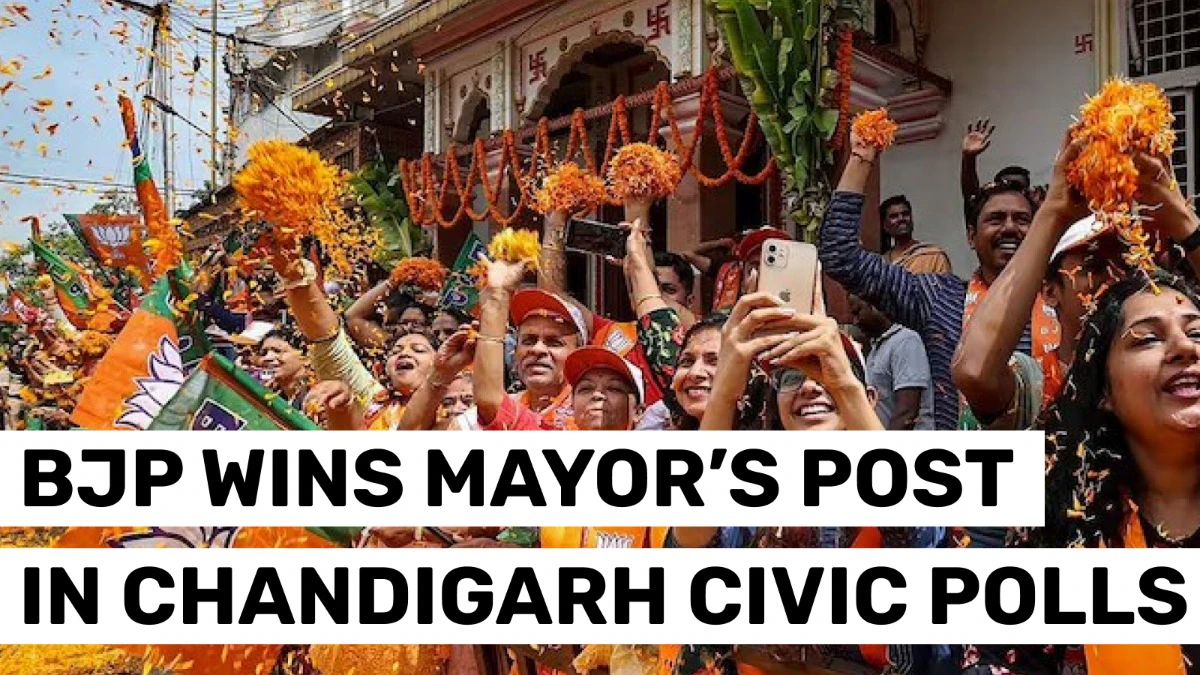In a dramatic electoral showdown, the Bharatiya Janata Party BJP Wins Chandigarh Mayor Elections, marking the first significant political clash between the National Democratic Alliance (NDA) and the newly formed INDIA bloc ahead of the upcoming general elections. The election results not only highlighted the political dynamics in Chandigarh but also served as a testing ground for the alliances gearing up for the larger battle on the national stage.
BJP candidate Manoj Sonkar emerged triumphant, securing 16 votes, while his rival from the Aam Aadmi Party (AAP), Kuldeep Kumar, garnered 12 votes. The election outcome was not without its share of controversy, as eight votes were deemed invalid, sparking protests from AAP and Congress councillors. With 14 councillors, the BJP managed to outpace AAP, which had 13 councillors, and the Congress with seven.
The strategic maneuvering in candidate nominations by the AAP-Congress alliance added a layer of complexity to the electoral battle. Kuldeep Kumar, representing the AAP, contested for the mayoral post, while the Congress fielded candidates for senior deputy mayor and deputy mayor positions.
The senior deputy mayor post witnessed a face-off between Kuljeet Sandhu of the BJP and Congress’s Gurpreet Singh Gabi, while the deputy mayor position was contested between BJP’s Rajinder Sharma and Congress’s Nirmala Devi.
As the election results were announced, AAP convener and Delhi Chief Minister Arvind Kejriwal accused the BJP of “cheating” and expressed dissatisfaction with the electoral process. The AAP-Congress alliance had strategically nominated candidates for various positions, demonstrating a united front against the BJP.
The mayoral elections in Chandigarh were originally scheduled for January 18 but were deferred at the last minute due to the poor health of the presiding officer, Anil Masih. This sudden delay triggered protests from the Aam Aadmi Party and Congress members, who alleged that the BJP orchestrated the turn of events.
The polls, initially rescheduled for February 6, were then moved up to January 30 following a directive from the Punjab and Haryana High Court. The Chandigarh mayoral elections became a battleground not only for local politics but also served as a precursor to the larger showdown between the INDIA bloc and BJP in the upcoming Lok Sabha polls.
The voting process commenced at around 11 am at the Assembly Hall of the Chandigarh Municipal Corporation (MC), Sector 17. To ensure law and order during the election, approximately 700 police personnel. Along with paramilitary force, were deploye at the municipal corporation building. The 35-member municipal corporation house witnessed a fierce competition. With the AAP and Congress holding a combined 20 votes, and the BJP, which has been in power for eight years, securing 15 votes – 14 from councillors and one from MP Kirron Kher. The magic number for victory was set at 19.

Following BJP’s Manoj Sonkar’s triumph in the Chandigarh mayoral election, chaos erupted in the House. Councillors from both the Congress and the AAP accused the BJP of cheating and failing to adhere to due electoral processes. AAP supremo Arvind Kejriwal went on to claim that the BJP’s actions amounted to “cheating in broad daylight,” expressing concerns about the party’s conduct in both mayoral and future Lok Sabha elections.
The victory for the BJP in the Chandigarh mayoral elections is significant not only for the party but also for the NDA. Setting the tone for the political landscape leading up to the general elections. The electoral battle showcased the strategies employed by both the BJP and the AAP-Congress alliance. Offering a glimpse into the political dynamics shaping up at the local and national levels.
The opposition’s allegations of foul play and the invalidation of votes added a layer of complexity to the electoral process. The accusations of cheating and dissatisfaction voiced by AAP and Congress leaders. Highlight the intensity of the political rivalry and the stakes involved in the battle for Chandigarh.
The mayoral elections, initially scheduled for January 18, were overshadowed by the unexpected deferment, leading to accusations of political manipulation. The subsequent rescheduling to January 30. Mandated by the Punjab and Haryana High Court, further fueled tensions among the competing parties. The election, initially a local affair, assumed greater significance as a testing ground for the INDIA bloc and BJP. Setting the stage for the larger political narrative in the upcoming Lok Sabha polls.
The strategic nominations by the AAP-Congress alliance underscored their commitment to presenting a united front against the BJP. The face-offs in the senior deputy mayor and deputy mayor positions added an extra layer. Of intrigue to the electoral drama. The AAP’s allegations of cheating and irregularities after the BJP’s victory heightened the political drama. With the opposition signaling that they would not take defeat lightly.
In the aftermath of the mayoral elections. The BJP’s focus will likely shift to consolidating its position in Chandigarh and leveraging. This victory as momentum for the forthcoming general elections. The allegations of cheating, protests, and accusations of electoral irregularities. On the other hand, may continue to reverberate in the political discourse. Potentially impacting the strategies and narratives of all involved parties.
Also Read : Alleged BJP Offer of ₹25 Crore to 7 AAP MLAs Sparks Political Controversy
In conclusion, the BJP’s victory in the Chandigarh mayoral elections is a pivotal moment. In the lead-up to the general elections. The clash between the NDA and the INDIA bloc, coupled with the AAP-Congress alliance’s strategic maneuvers. Has set the stage for a high-stakes political battle in the coming months. As the political landscape continues to evolve. The repercussions of the Chandigarh mayoral elections are likely to be felt far beyond. The confines of the city, shaping the narratives and strategies of political players on the national stage.







